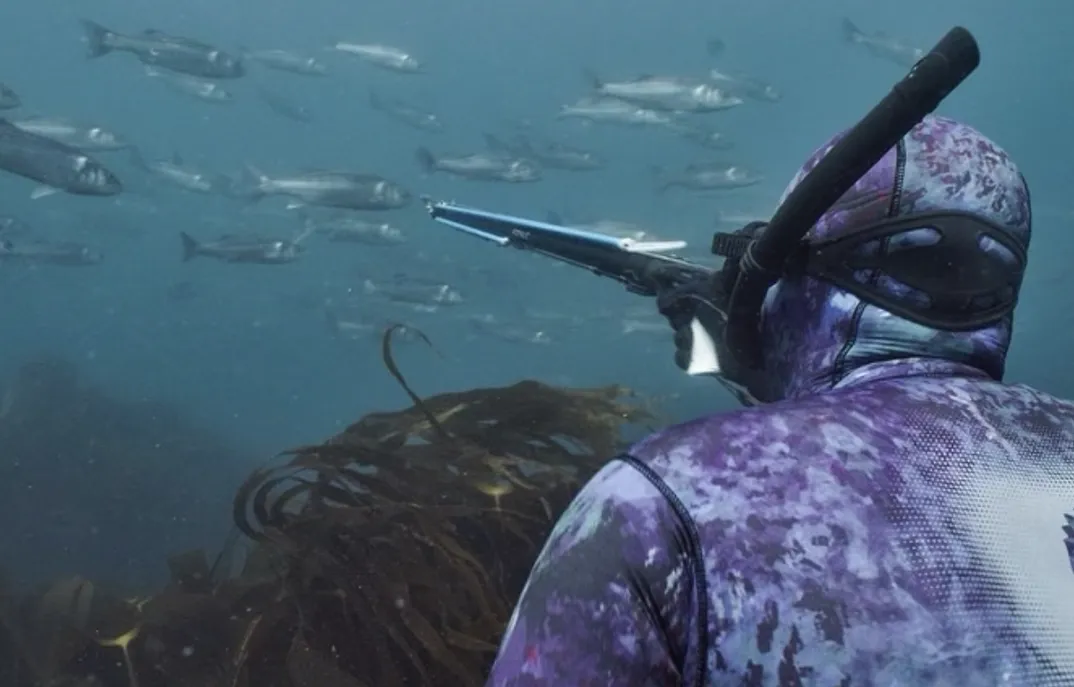
As spearfishers, we take pride in harvesting our own food. But as winter approaches, when storms, swell, poor visibility and short days limit our time in the water, many of us wonder whether stocking the freezer is responsible or not.
The short answer is: yes, it can be, provided we approach it with intention, awareness and respect for the ecosystems we rely on. This article looks at the benefits, potential pitfalls and best practices for freezing fish responsibly in the UK.
READ: Sustainable fishing as defined by the Marine Stewardship Council

Is Freezing Fish Sustainable?
Freezing your own catch is still one of the most sustainable ways to secure high-quality seafood for the months ahead. When we compare it to the alternatives – imported farmed fish, trawled species, long-distance supply chains, or supermarket meat – wild-caught fish taken by a responsible spearfisher is usually the greener option.
Spearfishing remains selective, low impact and naturally limited by:
- your breath hold
- your fitness
- weather and visibility
- what you can physically carry
- the time you choose to spend in the water
These built-in limits prevent over harvesting when we use good judgement.
The Benefits of Stocking the Freezer
You’re controlling the sustainability of your food
You harvested it, you know the species, the size, the area and the exact method. Few foods offer that level of transparency.
It reduces reliance on commercial fishing
When winter weather shuts down diving, many switch to shop-bought fish, often taken by methods that damage seabeds, operate unsustainably or generate huge bycatch.
It reduces the temptation to “make do” with poor choices
Having your own responsibly caught fish on hand means you avoid unsustainable meat and mass-produced seafood.
It encourages thoughtful planning
Freezing fish requires organisation: rotating catch, labelling species, only taking what you’ll actually use.
Where Stocking the Freezer Becomes Irresponsible
Like most things in spearfishing, it comes down to intention and restraint.
Freezing fish becomes irresponsible when:
- you take fish simply because they are there
- you shoot more than you realistically need
- you revisit the same reef repeatedly
- you target fish showing breeding behaviour
- you use a “fill the freezer at all costs” mindset
The goal is to avoid slipping from purposeful harvesting into opportunistic taking.
How Much Is Too Much?
There’s no single number that applies to everyone – it depends on your household size, diet, diving frequency and how long winter conditions last where you live.
A responsible approach is to:
- freeze only what you genuinely plan to use
- diversify your catch rather than hammer one species
- spread effort across different areas
- respect minimum sizes and local bylaws
- avoid clearing out multiple fish from the same small reef structure
Responsible freezer-filling is intentional, not excessive.

Make Every Shot Count
When stocking for the freezer, prioritise quality over quantity. Clean, ethical shots reduce waste. A precise shot:
- kills instantly
- protects fillet quality
- reduces stress and bleeding
- avoids damaging the fish needlessly
Missed or poorly placed shots harm fish populations and waste food – the opposite of responsible harvesting.
Store and Rotate Properly
Responsible freezing doesn’t end when the fish goes into the bag.
- label each pack with species and date
- vacuum seal or remove air to prevent freezer burn
- use older packs first
- avoid letting fish sit in the freezer for years
- check for quality before eating
A little care goes a long way and ensures you don’t end up spoiling any of your catch.
So, Is Stocking the Freezer Responsible?
Yes – when done with intention, restraint and respect for the sea. Freezing your own wild-caught fish is far more sustainable than buying mass-produced seafood or imported meat. It supports your own self-reliance and reduces pressure on commercial fisheries.
Being responsible doesn’t mean taking less than you need, it means taking exactly what you need, no more and no less.

Final Word
As spearfishers, we’re part of the ecosystem we harvest from, and the choices we make matter. Freezing fish for winter is absolutely responsible when we do it with awareness and purpose. If we rotate spots, choose clean shots and take only what we’ll genuinely use, we protect the very resource we depend on.
We are at our best when we act with intention – and when we remember that responsible spearfishing isn’t just something they do, it’s something we do together.

